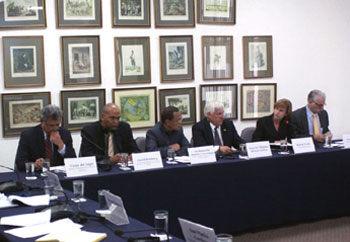Minister of Agriculture of Suriname visits IICA

San Jose, Costa Rica, March 18, 2011 (IICA). During a visit to the Headquarters of the Inter-American Institute for Cooperation on Agriculture (IICA), Hendrik Setrowidjojo, Minister of Agriculture, Livestock and Fisheries of Suriname, stated that the goal of his Ministry was to boost the agricultural sector, thereby increasing its current contribution of 6.8% to Gross Domestic Product (GDP) and making it the main supplier of the basic foods consumed in the Caribbean countries. The technical cooperation that his country received should be geared towards achieving that goal, the Minister added.
Minister Setrowidjojo visited IICA from March 14-15. He was accompanied by Gerrit Breinburg, Permanent Secretary in his Ministry, during talks held at Headquarters, as well as for a field trip organized to observe efficient agricultural systems.
The Minister stated that the aim of his government was to guarantee food security within the country, increase the income of small and medium-scale producers, boost the contribution of agriculture to the domestic economy, develop a sustainable sector and, above all, make it the main supplier of food in the Caribbean. “IICA is our partner in this endeavor and we are interested specifically in the support that it can give us in the area of capacity building to meet the challenges involved,” he remarked.
The Director General of the Institute, Víctor M. Villalobos, responded to the Minister’s request by reaffirming IICA’s commitment to the promotion of competitive and sustainable agriculture. “IICA belongs to the countries - to the 34 Member States that are its raison d’être,” he stated.
During the meeting with IICA officials, the Permanent Secretary highlighted some of the main challenges facing Suriname’s agricultural sector, including the lack of appropriate infrastructure and markets, inadequate access to credit, insufficient market information and limited processing capabilities in certain subsectors.
According to Víctor Del Ángel, IICA’s Director of Management and Regional Integration, “Challenges notwithstanding, Suriname’s agriculture has great potential, not only to provide the food that the country needs but also to supply other countries within the Caribbean, since it has the land and water needed to do so. We see opportunities for strengthening cooperation, especially since IICA will be unveiling its Regional Strategy for the Caribbean in a few weeks’ time.”
The Deputy Director General of IICA, Karen Lezny, briefed the Minister on the Institute’s Medium-term Plan as well as its Strategic Plan through 2020. The Director of Technical Cooperation, James French, with the assistance of specialists in each technical area, then explained IICA’s cooperation programs: Innovation for Productivity and Competitiveness; Agribusiness and Commercialization; Agricultural Health and Food Safety; Territories and Rural Well-being; Food Security; as well as Natural Resources, Climate Change and Environment.
“I will try to interest Suriname’s farmers in processes of this kind”
Following a daylong field trip, Minister Setrowidjojo expressed admiration for the production methods used in Costa Rica. “I will try to interest Suriname’s farmers in processes of this kind. I have learnt a great deal, this type of production is new to me,” he said.
The tour began with a visit to an integrated farm called “La Esperanza”, where, on only six hectares of land, the owners produce cow and goat cheese, eggs, organic vegetables and fertilizer, and raise pigs.
One of the most interesting aspects of the farm is that it is self-sustainable. The goats and cows feed on various shrubs, which allows for better use of the space available, and of their dung to produce fertilizer (using red earthworms) and energy (with a biodigester). This, in turn, makes it possible to lower maintenance costs and obtain higher levels of production.

The Minister observed the process involved in producing fertilizer. Each cow produces 25 kilos of dung per day, which yields 18 kilos of fertilizer, enough for around 400 lettuces.
The group of officials then visited two protected agricultural projects - the first involving the Camacho family. The climatic variations in the area in question made this type of agriculture the best choice, although the high cost of constructing a greenhouse forced the agro-entrepreneurs to opt for a more modest type of ventilated nursery known as a “zancudo.” The results have more than justified their decision, however.
Built in the shape of an umbrella (only the upper part of the structure is covered in plastic, with the rest left exposed and ventilated), the nursery does not generate the excessive heat characteristic of greenhouses in the tropics, but does protect plants from the rain. The construction of the nursery increased yields by 25%, making them comparable – and in some cases superior – to those obtained using the system of enclosed greenhouses, and for a much lower cost (a “zancudo” nursery requires an investment of around US$20,000, while greenhouses cost US$300,000-400,000).
Thanks to their visit, Minister Setrowidjojo and Permanent Secretary Breinburg were able to learn not only about IICA’s work, and possible synergies for cooperation between the Institute and the Ministry, but also about production methods that could be replicated in their country and help them to achieve their goal of making it the main supplier of food in the Caribbean.
For more information, contact
victor.delangel@iica.int
Photographic Gallery